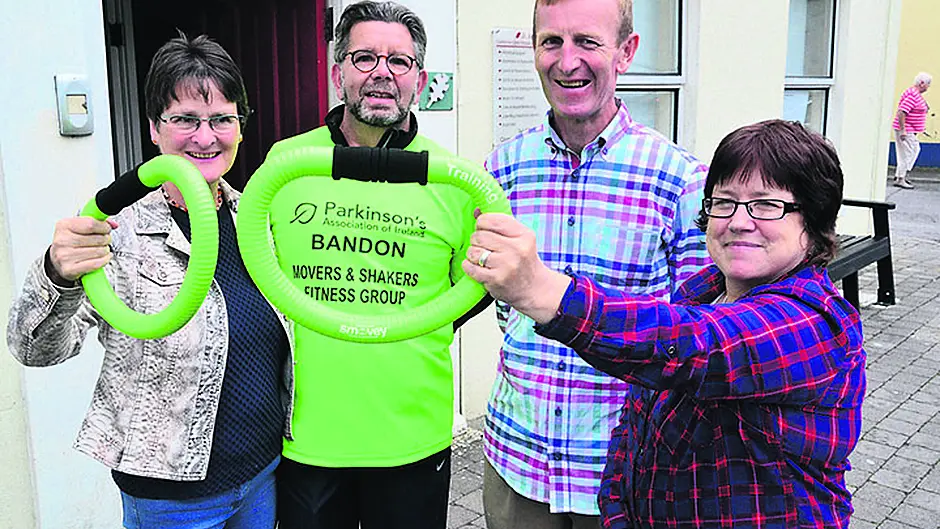Following on from the success of an initiative in Bandon, a new support group for people with Parkinson's Disease is now being set up in Skibbereen, writes Aisling Meath
Following on from the success of an initiative in Bandon, a new support group for people with Parkinson’s Disease is now being set up in Skibbereen, writes Aisling Meath
THERE are currently over 12,000 people with Parkinson’s Disease in Ireland, with this figure predicted to double over the next 20 to 30 years.
In 1817 London surgeon James Parkinson wrote an essay on ‘The Shaking Palsy’ and 60 years later French neurologist Martin Charcot named ‘Maladie de Parkinson’ as a disorder characterised by tremors, rigidity, disturbances of gait, posture and sleep, among other symptoms.
Since then a cure remains elusive and in Ireland the administration of the drug Levodopa, developed in the 1960s is the main treatment. Deep Brain Stimulation, and pump therapies, which deliver medicine directly into the body have proven to be of great benefit although some of these treatments are difficult to obtain in Ireland, with only 3% cent having access to DBS.
Increased longevity among the population is one factor propelling the surge in diagnoses, although anyone can be affected regardless of age. Indeed though cases are rare, children as young as 12 have been diagnosed with the condition.
Parkinson’s disease is a progressive neurological disorder caused by a deficit of dopamine in the brain, a chemical involved in controlling movement.
We all lose some of this chemical as we get older, but symptoms only become evident after we have lost over 80% of it, and people with Parkinson’s lose this chemical at a faster rate then others.
Tony Wilkinson, who relocated from London with his wife Kate and now lives in Bandon was diagnosed with Parkinson’s in April 2015. Having previously worked as a network planner for fibre optics, his hobbies were keeping bees and hens in his back garden. The couple always planned on moving to West Cork when they retired, Kate’s family are from Castletownbere, and Tony’s diagnosis precipitated that return.
‘Life in London became untenable from a mobility point of view,’ Tony told The Southern Star recently. ‘I simply couldn’t manage the Tubes anymore.’
He was already off work due to unrelated disc issues in his neck and was having a routine checkup when his doctor bluntly delivered the news that he had Parkinson’s. It was also one of the few times that Kate had not accompanied him, both assuming it was just a regular appointment.
‘It was a terrible shock – I couldn’t believe it. Afterwards when the news had sunk in, I began to piece together incidents which I had been having like “freezing”. I was unable to move one day out on the busy street. Then I began to realise it was Parkinson’s.’
Despite the shock of the diagnosis and adjustments to his lifestyle, Tony, with the support of his wife Kate is determined to live as normal a life as possible, and has set up a branch of the Parkinson’s Association of Ireland in Bandon holding regular meetings at St Michael’s Centre in Bandon.
People with Parkinson’s as well as their families are welcome to attend and there are also separate regular meetings for all carers.
‘We would like to thank the family of the late Betty Williams whose generous donations helped to establish the Bandon group,’ said Tony.
On Tuesday, September 19th next, the first meeting of the Skibbereen Parkinson’s group is due to take place at Cara House, Market street at 7pm with a presentation by Tony called ‘Living with Parkinson’s.’
‘One of my friends was diagnosed with Parkinson’s and he was feeling very depressed, staying indoors all the time. When he started coming to the meetings it really helped his spirit and has been a lifeline for his wife who is meeting other carers as well,’ said Tony. ‘I would encourage people to come along to the meetings in Bandon or Skibbereen and I hope that more branches will be set up in the West Cork region going forward.’
‘No two people are affected the same way with Parkinson’s,’ continued Tony. ‘Sometimes a person may not be able to walk a straight line, but can still dance, cannot write their name but can play the piano beautifully. They may find difficulty in talking but can sing really well. There are days when you can do anything, and others where you are totally wiped out of energy. You have to take it one day at a time and realise that plans have to be flexible.’
‘Although Tony has the diagnosis and the symptoms, it has a significant impact on our family and so in effect we all live with Parkinson’s,’ said Kate. ‘You never know what symptoms will manifest on any given day. If Tony wakes up in the morning and has to make a phone call and his speech is poor, then he won’t be able to do it, or if he needs to drive somewhere and he’s not feeling “with it”, he will have to cancel or I will drive him if I’m available,’ she explained.
‘Working for a global company I have been lucky enough to transport my job from London to Bandon using Skype, and it’s very comforting to know that Tony is among family and friends. If I’m away, they are ready to step in and help if necessary.’
Ted Horgan, who lives in Riverstick, is chairman of the Cork branch of the Parkinson’s Association of Ireland. As well as regular meetings he also organises the annual Munster Parkinson’s patients’ conference – the fifth was held in June, and the key role that support groups have in managing Parkinson’s was emphasised.
‘Parkinson’s is a family condition,’ said Ted. ‘No two people progress the same way. Sometimes symptoms develop slowly, or they may come quite rapidly.’
For the 12,000 people with Parkinson’s in Ireland there are currently only four specialised Parkinson’s nurses, and none in Cork.
‘Studies have shown that a specialised Parkinson’s nurse is trained to spot subtle changes and can intervene before symptoms develop into a painful condition for the person, who then has to present at A+E. With the current strain on hospital beds it makes economic sense to have more nurses.’ said Ted.
Graham Norton the famous chat show host from Bandon has also highlighted the issue of services for people with Parkinson’s in Ireland. His late father William had the condition and in 2013 he commented that ‘It is incredible to think that in this day and age the services and supports for people with Parkinson’s in Ireland are so poor.’
‘Parkinson’s is not a condition that can be easily hidden,’ says Kate. ‘Symptoms can be very visible. Tony and I decided early on not to try and hide it but be “loud and proud”. We want to help raise awareness in the community that if someone is fumbling at the checkout or stumbling in the street, there might be a very good reason for it.’ she says.







